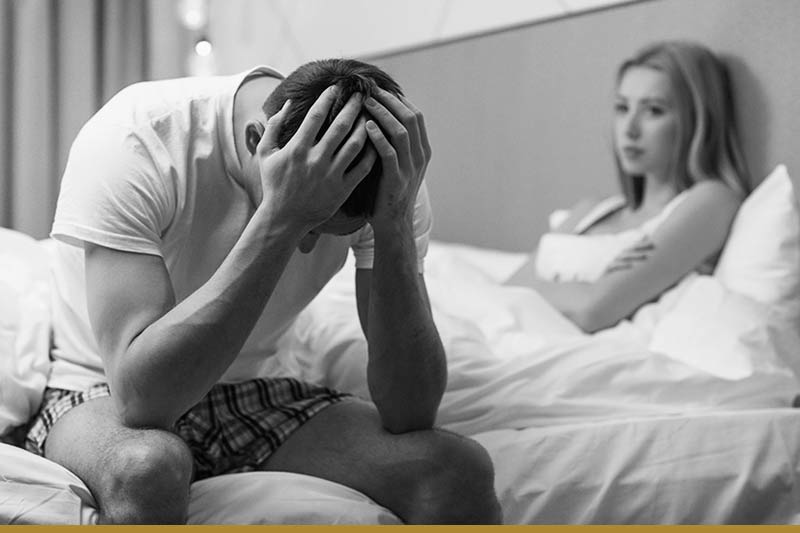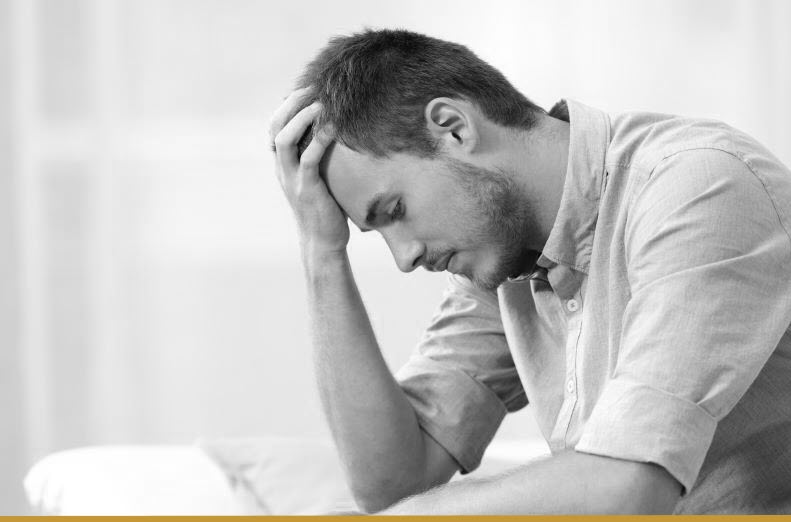Low sex drive can seriously undermine male self-esteem and become a source of great emotional distress. Luckily, there are ways to overcome this frustrating condition, regain sexual interest, and rebuild lost confidence.
Identifying underlying factors for reduced sexual desire is fundamental in tackling this health issue and restoring virility.
This article explores 12 causes of low libido in men and offers effective treatment methods.

Low libido in men is a temporary or long-term state of decreased interest in sexual activities, intimate interactions, and related behavior. It includes a lack of motivation for sexual intercourse, masturbation, or sexual fantasies.
Reduced sexual desire is typically a sign of an underlying, treatable health condition.
Low sex drive and erectile dysfunction (ED) are distinct yet commonly conflated medical terms. The following chart lays out key points of difference:
| Low Sex Drive in Men | Erectile Dysfunction (ED) | |
|---|---|---|
| What are the symptoms? | - Reduced sexual engagement - Diminished sex drive - Aversion to physical intimacy - Emotional dissatisfaction - Irritability or anxiety - Negative self-image - Fatigue - Depression | Difficulty achieving an erection, maintaining an erection, or a complete loss of ability to achieve an erection. Both physical and psychological factors contribute to ED. |
| What are the triggers? | Hormonal imbalance, medication, medical conditions, aging, stress, or mental health problems. Low testosterone levels often lead to reduced libido. | High blood pressure or cholesterol, diabetes, hardening of the arteries, restless leg syndrome (RLS), medication, aging, or mental health problems. |
| Do they overlap? | Low libido does not entail any physical sexual dysfunction. Loss of sexual desire may accompany or contribute to ED. | The sexual urge remains strong or wanes, depending on the accompanying psychological factors. |
| What are the treatment options? | Testosterone replacement therapy, supplementation, medication, and psychotherapy. | Medication, lifestyle changes, and medical interventions or devices, such as vacuum constriction devices (VCD). |
Note: Read about symptoms and causes of low sex drive in women.
There is no universal benchmark for a “normal” sex drive in men, and the medical community does not endorse such all-encompassing labels or terms. Sexual desire is highly individual, unpredictable, and prone to change at any time. Every adult male has a unique sexual response, behavior, and preferences.
To determine an out-of-range sex drive, compare it with your typical sexual behavior and urges. This comparison will ensure an accurate diagnosis and a suitable treatment strategy.
Causes for low libido in men can be hormone-triggered, age-related, or associated with a health condition. Lifestyle choices may also weaken or eliminate sexual motivation. Addressing the root cause is the first step in treating this problem.
Testosterone increases sex drive by regulating reproductive development, sexual behavior, and maintaining a healthy sexual function in men. Suboptimal testosterone levels can cause a dip in male libido and impact the person’s emotional wellbeing.
Temporary hormonal shifts can cause a short-lived decrease in sexual desire. On the other hand, men with chronically low testosterone levels can lose interest in sexual activities altogether. Furthermore, a decline in this hormone may provoke other health issues (e.g., hair loss, sweating, fatigue, irritability, brain fog) that indirectly diminish the desire for intimacy.
Testosterone deficiency can appear as a consequence of:
Certain types of medications can lower testosterone levels, resulting in low libido. These include:
Inform your doctor about all the medication you are currently taking. You may have to switch medications, adjust the dosage, or choose an alternative therapy method.
Chronic illnesses diminish sexual interest by disrupting hormonal activity, increasing physical discomfort, and impacting overall wellbeing. Sexual disorders, such as erectile dysfunction, premature ejaculation, or delayed ejaculation, can worsen the condition and increase anxiety about sexual performance.
The following health conditions can take a toll on male sex drive:
Frequent mood swings, persistent sadness, and low energy levels inhibit men’s desire to engage in sexual activities. Emotional intimacy requires a degree of vulnerability that can be mentally draining while battling depression.
Mental health problems can decrease libido in the following ways:
Note: Discover how hormonal shifts cause depression and learn ways to relieve its symptoms.
Weight gain can contribute to low libido in men through multiple mechanisms that often interact with each other.
Excess body fat, particularly around the abdomen, can lead to increased production of estrogen and decreased levels of testosterone, which is crucial for male sex drive and performance. Additionally, being overweight is often associated with conditions like type 2 diabetes and cardiovascular disease, which impair blood flow and lead to erectile dysfunction.
On the psychological level, weight gain impacts self-esteem and lowers mood, which dampens sexual desire.
Additionally, the effect of carrying extra weight, such as reduced stamina and respiratory issues, can make intercourse physically exhausting, further reducing libido.
Chronic stress impacts overall health, including sexual wellbeing. Feeling tense, nervous, or agitated takes the mind off any romantic endeavors and makes sexual arousal virtually impossible.
Prolonged stress impacts male libido in the following ways:
Note: Learn how to lower cortisol levels naturally and minimize the effects of daily stress.
Men experience a gradual decline in sex drive as they age and testosterone levels decrease. The degree of libido loss is unpredictable and variable. Contributing health factors include an endocrine disorder, chronic disease, medication side effects, alcoholism, depression, etc.
Sleep is vital for male reproductive health, including optimal sperm count, erectile function, and healthy libido. Most testosterone release occurs during sleep, enabling men to enjoy regular sexual activities.
Lack of sleep can reduce male sex drive by disrupting the following mechanisms:
Note: Read about how hormones trigger insomnia and ways to secure deep, restorative sleep.
Recreational drugs, alcohol, and tobacco can lower sperm count and lead to infertility by reducing testosterone production. This hormonal imbalance may interfere with sexual desire and alter typical sexual behavior.
Marijuana suppresses the pituitary gland responsible for testosterone production, while cigarette smoking disrupts optimal sexual function.
Consuming 10 to 14 alcoholic beverages weekly may weaken male libido by decreasing testosterone levels, increasing estrogen production, and stimulating testosterone discharge through the bloodstream.
Both a sedentary lifestyle and physical overexertion can impair sexual behavior and reduce male libido. Lack of movement increases the risk of chronic diseases, such as type 2 diabetes or obesity, that can lower sexual desire. Reduced blood flow, poor energy levels, and reduced mobility due to little or no exercise can further impair sexual function.
On the other hand, overtraining stresses out the body, leading to burnout, fatigue, and inability to be physically intimate or aroused.
Men with a negative body image or low self-confidence struggle to enjoy sexual activities. They often experience performance anxiety, fearing they won’t meet their partner’s expectations.
Feeling undesirable, unattractive, and insecure distorts male self-perception, reducing sexual desire. Thus, low self-esteem damages emotional and sexual wellbeing, creating a vicious cycle that is hard to break.
Lack of open communication and emotional availability in a relationship produces a psychological strain for both partners. Conflicts can easily flare up and carry over into the bedroom, leading to less intimacy, reduced sex drive, and greater emotional distance.
Loss of connection may also result from trust issues, infidelity, or incompatible sexual preferences. Regardless of the cause, restoring trust and a firm bond is crucial for rekindling romance and increasing sexual satisfaction.
Reduced sex drive in men may stem from an unresolved childhood trauma. Inconsistent caregiving, domestic violence, or sexual abuse profoundly impact mental, emotional, and sexual health. These consequences typically extend well into adulthood.
Men who have had a traumatic experience or have lived in a neglectful environment may struggle to show their feelings and connect. They can also develop sexual aversions, fears, and insecurities.
This type of problem requires professional psychological support and individual counseling.

Addressing the underlying health issue is the first step in increasing male sex drive. Your medical provider will recommend the best treatment option based on the root cause of decreased libido.
Here are some of the treatments that help increase male sex drive:
Note: Schedule your total testosterone therapy in Phoenix, at Vibrant Vitality Clinic.
Male sex drive is a controversial, little-understood topic. Identifying the causes of low libido can help men rebuild self-confidence and enjoy sexual activities again. Since both young and older men can experience this health condition, adequate treatment and expert advice remain essential.
Contact the Vibrant Vitality Clinic staff for more information about male sexual health.




4325 E Indian School Rd, Suite 130
Phoenix, AZ 85018
United States
(480) 422-2058
info@vibrantvitalityclinic.com
Monday - Friday: 9:00 am - 6:00 pm
Saturday: 9:00 am - 3:00 pm
Sunday: Closed
